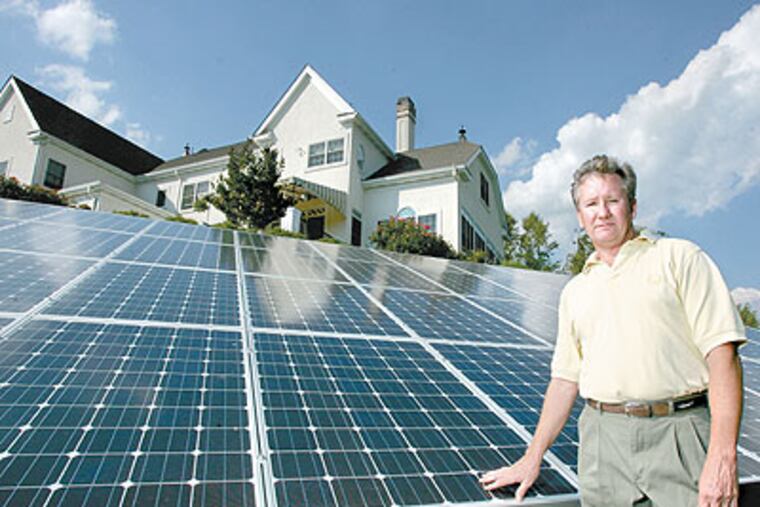Pa. quietly pulls back solar tax credit
For a state that says it's trying to encourage more alternative-energy use, this is not an especially proud development. Which may explain why Pennsylvania put out no news releases and held no news conferences about it.

For a state that says it's trying to encourage more alternative-energy use, this is not an especially proud development. Which may explain why Pennsylvania put out no news releases and held no news conferences about it.
In fact, physician Mark Lounsbury said it was his own phone call to the state Department of Revenue a few weeks back that led him to a disheartening discovery: The state tax credit approved for a $75,000 photovoltaic system he added to his Chadds Ford home would not be coming.
Not for him or for the 109 other applicants OKd for more than $4 million in Alternative Energy Production Tax Credits since Gov. Rendell announced their availability last July. The credit was to cover 15 percent of a project's total costs, after all other grants and subsidies were subtracted, and was not to exceed $1 million per taxpayer. Lounsbury's share would have been $4,200.
Turns out that the money for those tax credits - about $50 million over eight years from the state's general fund - was eliminated as part of the 101-day budget duel last fall. The move came as the recession choked revenue streams and interest groups fought back a Rendell proposal for a new funding source - taxing natural gas extracted from Pennsylvania's Marcellus Shale.
"This is one of a number of good programs . . . that were unfortunately reduced substantially or put on hiatus," Rendell spokesman Michael Smith said this week. "We're still making great headway in building a green economy here."
In all, 142 such line-item cuts were made in the $27.8 billion budget ultimately approved in October, reducing spending by more than 1 percent from 2008, the year the legislature established the Alternative Energy Production Tax Credit.
"It's not a good thing," John Hanger, the state's secretary of environmental protection, said of the tax credit's elimination through at least June 2011. "But people need to know it's the result of compelled budget choices."
The cuts were necessary to ensure funding for public education, prison systems, and Medicaid for senior citizens living in nursing homes, Hanger said.
"Of course, it's much better for the solar industry and the future of Pennsylvania's economic competitiveness [in the green economy] if we could have maintained that tax credit, but I fully understand why we couldn't," Hanger said.
He offered no certainties about its revival anytime soon. Legislators are faced with "another horrendous budget," he said.
Federal tax credits and grants from the Pennsylvania Sunshine Program remain available to homeowners and small businesses for solar-system purchases, he stressed. Together, those can reduce the purchase price for a solar unit by nearly 60 percent.
New Jersey is considered well ahead of Pennsylvania on solar incentives, but times have turned tough there, too. Applications for solar rebates are not currently being accepted, as a result of $158 million in cuts to the state's Clean Energy Trust Fund ordered by Gov. Christie.
None of that is much solace to Lounsbury, though.
"It just burned my butt when I came across this," the anesthesiologist said of learning that Pennsylvania's tax credits evaporated without a single state dollar allocated.
He acknowledged that he was financially better-equipped than many to absorb such a curveball. But there are Pennsylvanians who aren't, which has Lounsbury - and a legislator he complained to - particularly vexed that the state chose to end the tax credit retroactively.
"It was done in a way that is unfair to the people who were planning on it," said State Rep. Chris Ross (R., Chester).
Ross said he voted against the last state budget for a number of reasons, but he could not say with certainty whether he was aware at the time that it included the elimination of the alternative-energy tax credit.
And those Sunshine Program incentives? Adding insult to injury, Lounsbury said, he recently learned from his accountant that the state is going to tax as income the $22,000 in Sunshine funds he received to offset the price of his solar system.
"It's still the right thing to do," he said of going solar. "I just didn't expect all the baloney."